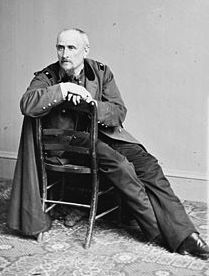A Few Words on Soldier Motivation and Leadership from Regis de Trobriand
 Visitors to the battlefields often marvel at the way soldiers would line up, shoulder to shoulder, and march into the flaming jaws of death. While many things motivated men to move forward like that, such motivations are hard to describe and even harder to understand, particularly through a lens more than 150 years old.
Visitors to the battlefields often marvel at the way soldiers would line up, shoulder to shoulder, and march into the flaming jaws of death. While many things motivated men to move forward like that, such motivations are hard to describe and even harder to understand, particularly through a lens more than 150 years old.
But as Regis de Trobriand explained in his memoir Four Years with the Army of the Potomac, leadership played a key a role. The talented brigade commander—who saw excellent leadership and awful leadership in the Federal III Corps—offered some insights worth considering:
“It is not by becoming addicted to some vulgar vice forbidden amongst [the soldiers], or by making of his authority an instrument of intrigues, that one acquires their confidence, but simply by being worthy of commanding. Be just, and you can be severe without arousing any resentment, even amongst those who may deserve punishment. Be partial, and your indulgence for some, with your severity towards others, will bring the contempt of all. At the bottom of his heart, the soldier always has a feeling of uprightness, which governs the judgment he passes on his chiefs. . . . That is why poor generals spoil good soldiers, and good generals reform poor soldiers.
“The same men fight very differently, according to who commands them. If they have confidence in their commander, they will dash upon the enemy with an enthusiasm without reserve, for they know that they regiment will not be compromised without necessity, and that, if they must die, their death will at least be useful to the cause to which they are devoted. But if they feel they are poorly led, and if they are afraid of being sacrificed without result, from lack of judgment or by an intellect obscured by the fumes of whiskey, their enthusiasm gives place to indecision. They will go through fire in obedience to discipline, and to save their amour propre; and if they encounter a stubborn resistance, where they would have gone in and forced a position without counting their losses, one may be assured that they will fall back, blaming the chief, whom their mistrust makes responsible for the check.”
Leadership makes the difference
This explains in part at least the fanatical dedication soldiers have toward their commanders and the devastation they feel when they are killed.